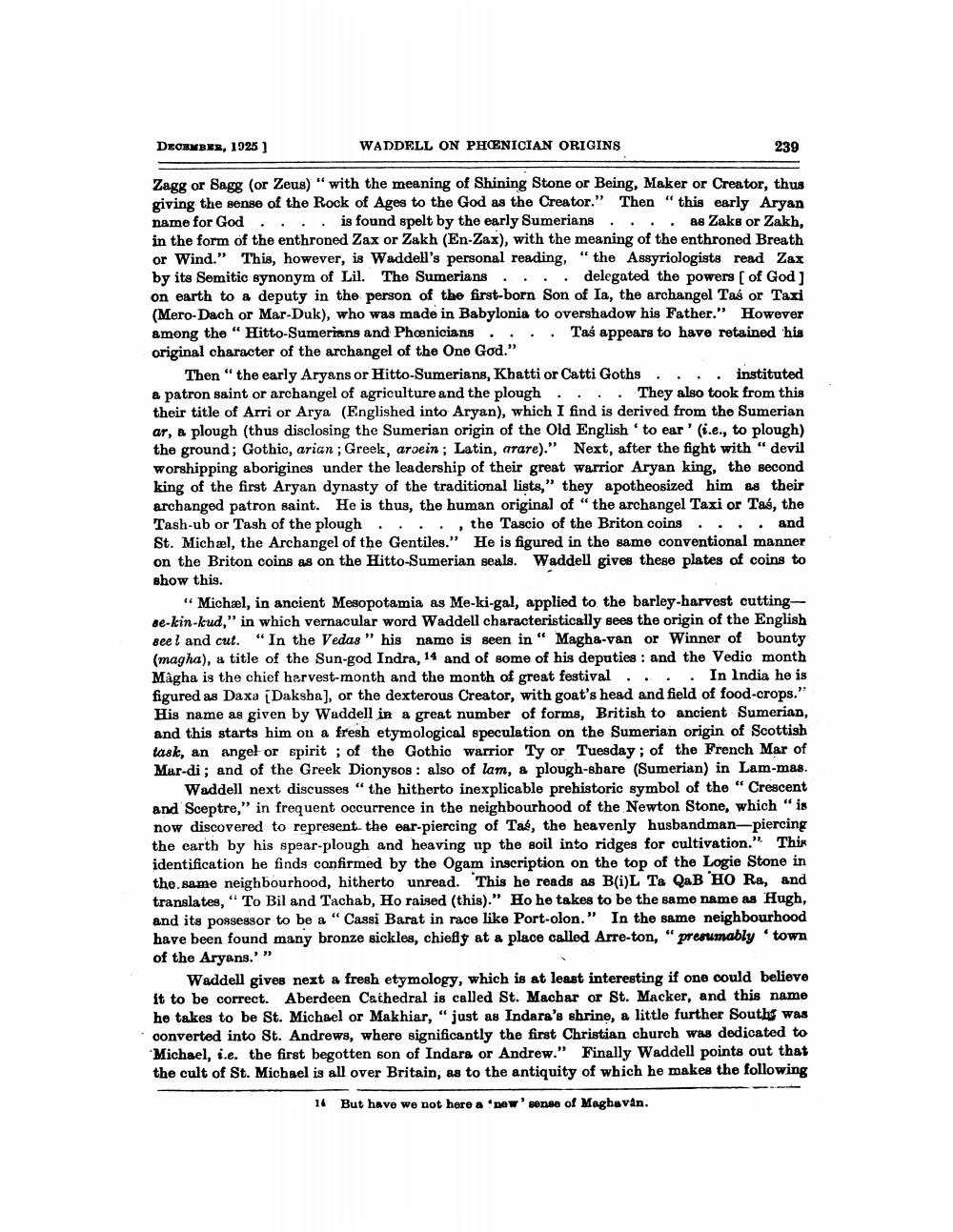________________
DECEMBER, 1925]
WADDELL ON PHOENICIAN ORIGINS
239
Zagg or Sagg (or Zeus) "with the meaning of Shining Stone or Being, Maker or Creator, thus giving the sense of the Rock of Ages to the God as the Creator." Then "this early Aryan name for God. . . . is found spelt by the early Sumerians. .as Zaks or Zakh, in the form of the enthroned Zax or Zakh (En-Zax), with the meaning of the enthroned Breath or Wind." This, however, is Waddell's personal reading, "the Assyriologists read Zax by its Semitic synonym of Lil. The Sumerians .delegated the powers [ of God] on earth to a deputy in the person of the first-born Son of Ia, the archangel Tas or Taxi (Mero-Dach or Mar-Duk), who was made in Babylonia to overshadow his Father." However among the "Hitto-Sumerians and Phoenicians ... Tas appears to have retained his original character of the archangel of the One God."
Then "the early Aryans or Hitto-Sumerians, Khatti or Catti Goths instituted a patron saint or archangel of agriculture and the plough . . . . They also took from this their title of Arri or Arya (Englished into Aryan), which I find is derived from the Sumerian ar, a plough (thus disclosing the Sumerian origin of the Old English' to ear' (i.e., to plough) the ground; Gothic, arian; Greek, aroein; Latin, arare)." Next, after the fight with "devil worshipping aborigines under the leadership of their great warrior Aryan king, the second king of the first Aryan dynasty of the traditional lists," they apotheosized him as their archanged patron saint. He is thus, the human original of "the archangel Taxi or Tas, the Tash-ub or Tash of the plough... ., the Tascio of the Briton coins. . . . and St. Michael, the Archangel of the Gentiles." He is figured in the same conventional manner on the Briton coins as on the Hitto-Sumerian seals. Waddell gives these plates of coins to show this.
"Michael, in ancient Mesopotamia as Me-ki-gal, applied to the barley-harvest cuttingse-kin-kud," in which vernacular word Waddell characteristically sees the origin of the English seel and cut. "In the Vedas" his name is seen in " Magha-van or Winner of bounty (magha), a title of the Sun-god Indra, 14 and of some of his deputies: and the Vedic month Magha is the chief harvest-month and the month of great festival.... In India he is figured as Daxa [Daksha], or the dexterous Creator, with goat's head and field of food-crops." His name as given by Waddell in a great number of forms, British to ancient Sumerian, and this starts him on a fresh etymological speculation on the Sumerian origin of Scottish task, an angel or spirit; of the Gothic warrior Ty or Tuesday; of the French Mar of Mar-di; and of the Greek Dionysos: also of lam, a plough-share (Sumerian) in Lam-mas. Waddell next discusses "the hitherto inexplicable prehistoric symbol of the "Crescent and Sceptre," in frequent occurrence in the neighbourhood of the Newton Stone, which "is now discovered to represent the ear-piercing of Tas, the heavenly husbandman-piercing the earth by his spear-plough and heaving up the soil into ridges for cultivation." This identification he finds confirmed by the Ogam inscription on the top of the Logie Stone in the same neighbourhood, hitherto unread. This he reads as B(i)L Ta QaB 'HO Ra, and translates," To Bil and Tachab, Ho raised (this)." Ho he takes to be the same name as Hugh, and its possessor to be a "Cassi Barat in race like Port-olon." In the same neighbourhood have been found many bronze sickles, chiefly at a place called Arre-ton, " presumably 'town of the Aryans.""
Waddell gives next a fresh etymology, which is at least interesting if one could believe it to be correct. Aberdeen Cathedral is called St. Machar or St. Macker, and this name he takes to be St. Michael or Makhiar, "just as Indara's shrine, a little further South was converted into St. Andrews, where significantly the first Christian church was dedicated to Michael, i.e. the first begotten son of Indara or Andrew." Finally Waddell points out that the cult of St. Michael is all over Britain, as to the antiquity of which he makes the following
14 But have we not here a 'new' sense of Maghavan.




